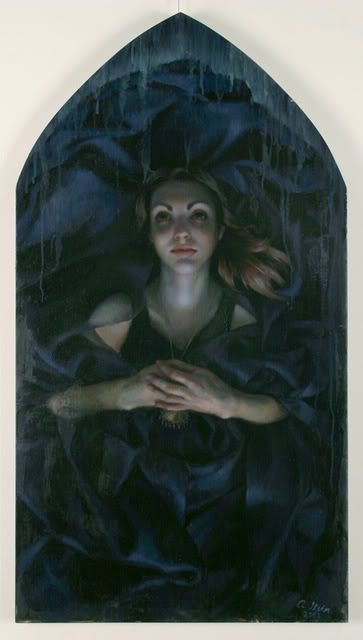
Adrienne Stein, "I Looked for the One my Heart Loves" (2006)
Many of you, no doubt, know and grew up on the childhood story of the duckling that went around searching for its mother. It introduced children to various animals, and likewise provided children with a sense that was a place they belonged, some place that could properly be called home.
Heidegger argued in Being and Time that we needed to find that spot, that home, embrace it and make it ours in order live genuinely human lives. This home, according to Heidegger, was not something chosen arbitrarily; it was more something into which we were thrust by history and which we needed to accept. In effect, Heidegger is describing the idea of Tradition. That there is a cultural and historical conversation into which one is thrust, that one cannot opt out of, and with which one must wrestle.
To be American especially, and really one can say more generally to be a member of liberal society, is to be part of a tradition of forgetting for Heidegger. Systemic forgetting. The destruction of tradition. In fact the destruction of tradition has become the great liberal tradition. We are watching that tradition wage a crusade in its name in our own time. This is the tradition of which we are a part.
Having destroyed the traditions of our ancestors, or at least systematically forgotten our own origins and history, we struggle under the need for some sort of positive tradition to bind us together. Having wiped out the liturgical calendar, we institute a new one: Halloween, Thanksgiving, Christmas, New Years, Valentine's Day, etc. replaces the rhythms of a lost liturgical calendar which contained periods of feasts and fasting; penance, reconciliation and joy.
And what if one feels the weight of this loss, the loss of tradition? What is one to do? Can one choose a tradition? Having been catechized into the tradition of traditionlessness, can one enter into a new conversation that remains self-consciously historical? Is conversion possible?
I chose Catholicism. It was not my tradition. My tradition was...Pietist, Enthusiastic, Holiness, Pentecostal...the convergence of various Wesleyan strains into the historically naive Christianity that suits America so very well. But how does one convert. The awakening to history that meant the break with Pietism in its various forms does not mean that one now is part of some other history. It simply means that one is self-conscious of the historical contradiction within which one finds oneself.
One awakens to history and like the lost duck one turns to that which is near, to that closest body which seems in some form or another to have preserved historical consciousness of its own being, and asks "Are you my mother?"
-LoA
2 comments:
Somebody, perhaps James Joyce, said that history is the dream/nightmare from which he is trying to awaken.
Quite so.
Especially in the world of now when all the cultures of the world, and their varying and conflicting histories, are now living altogether in a very small boat.
And some, especially Christians and Moslems, and to a lesser extent Jews, are prepared to destroy the entire world by imposing their "one true history" onto everyone else.
And by the way, any institution that claims to "posess" the one true way/faith/revelation has effectively declared war against everyone else, and given half the chance, will use whatever means available to achieve that world conquering victory---in the name of their his-story.
of course the claim to possess Truth is always idolatrous, whether by an institution or individual.
On the other hand, the pursuit of Truth is unavoidable. This unavoidably means an attempt to see things as an ordered Whole and the attempt to actualize that Whole. This is going on all the time in every culture and by every person. This leads to tensions as relative goods come into conflict with one another. This happens in one's psyche, one's home, it happens socially and politically and yes even at the level of History -- especially as local histories begin to self-consciously converge into world history.
your concern about the imposition of ideology is a concern about idolatry or shirk. but in fact, idolatry is an attempt to replace Truth with something finite, relative and incomplete and thus to banish and if possible destroy everything else as evil. idolatry is present in many places: from DC to Rome to our thoughts and actions. because it is partial it has no real power and indeed fails to understand even itself since in order to understand itself it would need to turn toward the Whole.
best wishes,
LoA.
Post a Comment